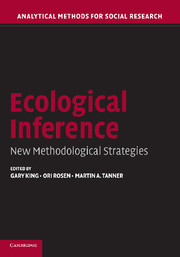Book contents
- Frontmatter
- Contents
- Contributors
- Preface
- INTRODUCTION
- PART ONE
- PART TWO
- PART THREE
- PART FOUR
- 13 Common Framework for Ecological Inference in Epidemiology, Political Science, and Sociology
- 14 Multiparty Split-Ticket Voting Estimation as an Ecological Inference Problem
- 15 A Structured Comparison of the Goodman Regression, the Truncated Normal, and the Binomial–Beta Hierarchical Methods for Ecological Inference
- 16 A Comparison of the Numerical Properties of EI Methods
- Index
13 - Common Framework for Ecological Inference in Epidemiology, Political Science, and Sociology
Published online by Cambridge University Press: 18 May 2010
- Frontmatter
- Contents
- Contributors
- Preface
- INTRODUCTION
- PART ONE
- PART TWO
- PART THREE
- PART FOUR
- 13 Common Framework for Ecological Inference in Epidemiology, Political Science, and Sociology
- 14 Multiparty Split-Ticket Voting Estimation as an Ecological Inference Problem
- 15 A Structured Comparison of the Goodman Regression, the Truncated Normal, and the Binomial–Beta Hierarchical Methods for Ecological Inference
- 16 A Comparison of the Numerical Properties of EI Methods
- Index
Summary
ABSTRACT
Ecological studies arise within many different disciplines. This chapter describes common approaches to ecological inference in an environmental epidemiology setting, and compares these with traditional approaches in political science and sociology. These approaches vary considerably, both in their use of terminology and notation, and in the relative importance of the various issues that make ecological analyses problematic. The aims of this chapter are twofold. Firstly, we describe ecological inference in an epidemiology setting, where the interest is in the relationship between disease status and exposure to some potential risk factor. We concentrate on those issues which are of particular concern in epidemiology, for example the presence of additional (possibly unmeasured) covariates, termed confounders. Secondly, we seek to unite the current work in epidemiology, political science, and sociology by clarifying differences in terminology, by describing commonly used approaches within a common statistical framework, and by highlighting similarities and differences between these approaches. Often different models can be attributed to different sets of underlying assumptions; we emphasize that such assumptions are crucial in the conclusions drawn from ecological data, and their appropriateness should be carefully considered in any specific situation. Combining approaches from all three disciplines gives a broad range of possible assumptions and available techniques from which to choose.
- Type
- Chapter
- Information
- Ecological InferenceNew Methodological Strategies, pp. 303 - 332Publisher: Cambridge University PressPrint publication year: 2004
- 10
- Cited by



